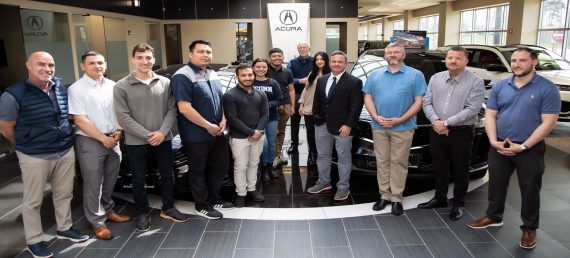Honda Marine Science Foundation Awards Three Projects
Continuing its efforts to help restore marine ecosystems and strengthen resilience against climate change, the Honda Marine Science Foundation will support three projects centered on “living shorelines” along the West Coast: San Francisco Bay Transition Zone Restoration Project in Northern California; Upper Newport Bay Living Shorelines Project in Southern California; and Sunlight Shores Living Shoreline Restoration Project in Puget Sound, Washington.
Honda established the Honda Marine Science Foundation based on inspiration from the Japanese concept of sato-umi – the idea that humans can and should have a mutually beneficial relationship with coastal ecosystems – with the purpose of fostering meaningful cross-sector collaboration to address the impact of climate change on oceans and intertidal areas. Expanding on last year’s support of Southern California oyster restoration efforts, the foundation’s upcoming projects aim to advance the understanding and implementation of living shorelines, providing natural approaches to protecting coastal habitats and communities. Living shorelines provide habitat value, enhance coastal resilience, and boost ecosystem services.
“Honda Marine Science Foundation is proud to support this year’s grantees in their efforts to tackle critical environmental issues,” said Steve Center, Honda Marine Science Foundation chairman. “Together, we will promote education through research, helping to further the understanding of how to effectively advance living shorelines and the role living shorelines play in addressing coastal threats.”
San Francisco Bay Transition Zone Restoration Project
The San Francisco Bay Transition Zone Restoration Project, an initiative of Save The Bay, is a regional effort focused on wetlands restoration, enhancement and maintenance in transition zones between the tidal marsh and the terrestrial environment. Healthy transition zones provide vital ecosystem services, including absorbing storm surges and protecting communities from flooding, filtering urban pollutants out of estuarine flows, supporting diverse native wildlife, providing migration space for wildlife as sea levels rise, and creating accessible areas for public recreation and ecological education. The grant from Honda Marine Science Foundation will support these activities and the operation of three native plant nurseries to generate thousands of native seedlings annually.
Upper Newport Bay Living Shorelines Project
Three organizations, Orange County Coastkeeper (OCCK), California State University Long Beach (CSULB), and California State University Fullerton (CSUF), collaborated to create the Upper Newport Bay Living Shorelines Project, which focuses on oyster and eelgrass restoration to stabilize local shorelines. The goals of the project are to improve the ecological integrity and resilience of Southern California embayments as well as increase public awareness and stewardship of coastal habitats.
Sunlight Shores Living Shoreline Restoration Project
The Sunlight Shores Living Shoreline Restoration Project aims to increase the amount of living shorelines in the Northwest Straits region of Puget Sound, Washington. The Northwest Straits Foundation started the project to restore natural shorelines through the removal of manmade shoreline structures such as cement and log piles. The project also aims to educate shoreline landowners about the importance of living shorelines and seek their support for natural approaches to shoreline protection.
For its inaugural project in 2017, the Honda Marine Science Foundation partnered with the University of California, Santa Barbara (UCSB) Bren School of Environmental Science & Management on a research initiative that sought to provide a framework for future Southern California oyster restoration efforts. A group of Bren School students researched the Olympia oyster for a year to educate the public on benefits of restoring native oyster populations for shoreline stabilization. The students published their thesis in June 2017, concluding that large-scale Southern California oyster restoration is both viable and valuable.
Each year, the foundation identifies up to three critical projects that support its mission of marine ecosystem restoration and climate change resilience, and awards research grants for these projects.

